#napoleonic era
Text
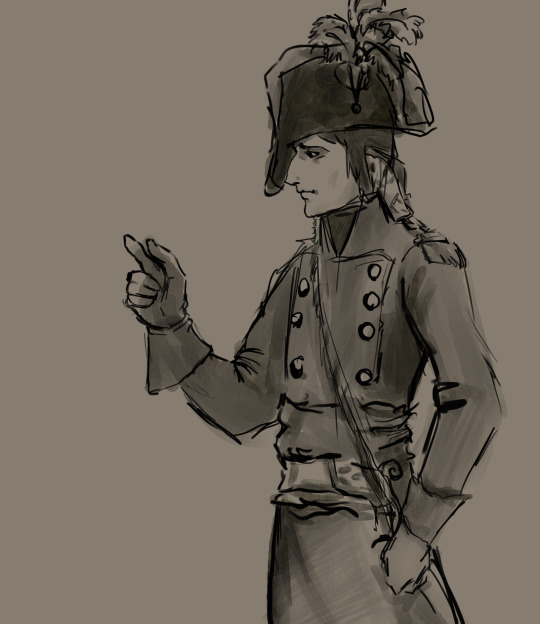
Hi whatslur fans welcome back to my youtube channel!!
#napoleon#napoleonic era#art#artwork#clip studio paint#bad art#whatslur you art SUCKS#napoleón bonaparte
48 notes
·
View notes
Text

Stop using anti-self language✋️
49 notes
·
View notes
Text

little doodle i never posted HAHAH
my precious naps and juno
#art#my art#fanart#ship art#napoleonic era#napoleon#napoleon bonaparte#first french empire#napoleonic wars#jean andoche junot#napjuno#french empire#french revolution#history fanart#history fandom#history#french history
32 notes
·
View notes
Text
Citizen Cooks in the Age of Napoleon
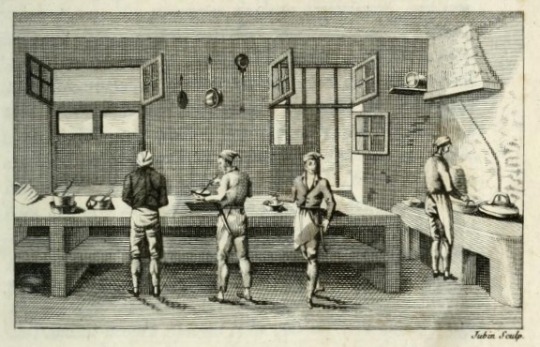
Excerpt about the role of cooks in France after the abolition of culinary guilds, and how they navigated a world which demanded for them to find new ways to stay relevant and prosperous. From Defining Culinary Authority: The Transformation of Cooking in France, 1650-1830 by Jennifer J. Davis:
French cooks sought new sites upon which to rebuild the authority of culinary labor. Throughout the early nineteenth century cooks increasingly adopted scientific terms to demonstrate their reliability and profound knowledge of the culinary arts. Such language communicated the author's education and distinction, just as an appeal to an elite patron had done in the 1660s and referral to a cook's professional expertise had done in the 1760s. The rhetoric and institutions of scientific knowledge also provided a means of distinguishing men's work from women's in the post-revolutionary era. During the early nineteenth century, cooks' claims to scientifically valuable savoir-faire rested on three crucial points of culinary innovation: food preservation, the improved production of bouillon, and gelatin extraction.
As these processes left the realm of traditional knowledge and became sites of scientific inquiry by tradespeople and amateurs alike, cooks sought to maintain authority in this arena by including scientific terms and theories in cookbooks, advertisements, and government petitions.
Two factors encouraged cooks' claims to scientific knowledge during this era. First, when Napoleon Bonaparte took the reins of government as first consul in 1799 and established himself as emperor in 1804, he raised medical doctors and academic scientists, Idéologues, to positions of political prominence. From these posts, the Idéologues subsidized experiments and inventions deemed useful to the nation and encouraged the popularization of science in the public sphere through state sponsorship of exhibitions and print forums. The Idéologues particularly supported research related to food preparation and preservation that might benefit France's armies and navies, with obvious benefits for professional cooks. Many cooks presented their particular techniques to the government during this time, seeking both financial recompense and public acclaim. Second, a voluntary association closely allied with the Idéologues' vision, the Société d'encouragement pour l'industrie nationale (Society for the Encouragement of National Industry), provided a forum in which formally trained scientists, politicians, merchants, artisans, and curious educated men might unite to address questions that inhibited French science and industry.
Together, these men sought to develop a more coherent program for industrial advancement than any one group could achieve independently. The society explicitly sought to join scientific knowledge to artisanal practical expertise, recognizing that each group had strengths that would benefit industrial development. This association invested heavily in three diffuse projects that eventually infused the most basic culinary processes with scientific awareness: new methods of food preservation to benefit the nation's armies and navies, new methods of stock preparation to sustain the nation's poor, and new methods of extracting gelatin from bones to improve hospital and military diets at little added expense.
#Illustration from L'art du Cuisinier by Antoine Beauvilliers (1814)#Defining Culinary Authority: The Transformation of Cooking in France 1650-1830#Jennifer J. Davis#David#citizen cooks#napoleon#napoleon bonaparte#napoleonic#napoleonic era#first french empire#french empire#19th century#french revolution#cooks#food#culinary history#france#1800s#history#french history#Antoine Beauvilliers#Beauvilliers#Society for the Encouragement of National Industry#Société d'encouragement pour l'industrie nationale
25 notes
·
View notes
Text
OKAY HEAR ME OUT:
All of these edgy science fiction / fantasy novels about overthrowing evil empires and then becoming the very thing that you sought to destroy and the main character ending up as bad as the regime they overthrew and all that, you know?
You could very easily make a dramatised version of the life of Napoleon Bonaparte, transplant it into generic fantasy evil empire world, change the names of the historical figures to fictional names, and all the tumblrinas would eat that up.
Picture this: Napoleon Our protagonist is born the second child in a large family on Corsica generic fantasy island, is sent to a military academy in France evil empire, and begins to rise through the ranks of the army. A revolution occurs, in which the French evil empire monarchy is overthrown, and our protagonist, a supporter of the revolution, fights for the revolutionary government against royalist uprisings and the first coalition other evil empires. Along the way, our protagonist becomes increasingly powerful, as well as being an absolute slut. After a series of military campaigns, our protagonist, seeing the corruption of the directory new evil government, stages a coup and becomes first consul generic fantasy leader. However, over the course of the book, our protagonist has acquired a huge ego and lost many morals, and ends up themself the emperor of France fantasy kingdom. "Morally grey" shenanigans ensue. (Of course, our protagonist would have many many love interests, such as Josephine de Beauharnais hot milf, Jean-Andoche Junot hot best friend, and Tsar Alexander I enemies-to-lovers-to-enemies-again.) (Main character would be characterised as being the most pathetic little person to ever exist who is frequently bullied for being quirky and not-like-other-girls)
#THIS POST IS 100% SILLY OKAY PLEASE DON'T TAKE ANYTHING I SAY SERIOUSLY#history#napoleon#napoleonic#napoleonic era#napoleon bonaparte#books#bookblr#fantasy#fantasy books#fantasy writing#writing#writeblr#literature#locked tomb#iron widow#baru cormorant#i'm sorry for this
715 notes
·
View notes
Text

HAPPY HOLIDAYS 🎁🎄🦌👑
352 notes
·
View notes
Text

176 notes
·
View notes
Text

men at arms II
366 notes
·
View notes
Text
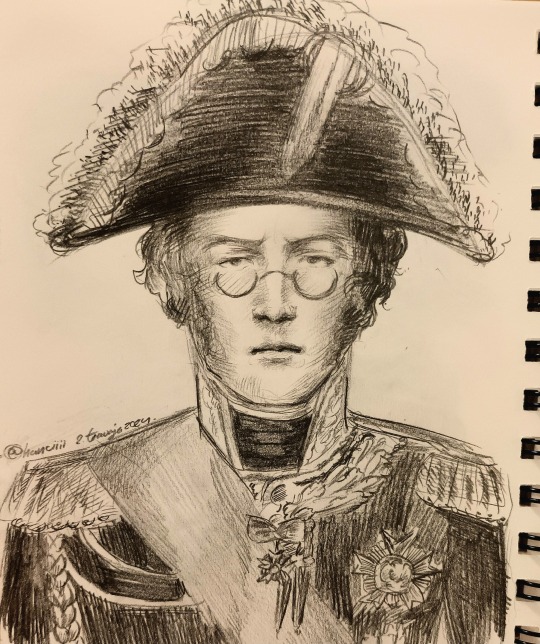
another sketch today!!!! ill hope ill get some inspiration to make an actual piece soon ♡
#louis nicolas davout#sketch#napoleonic wars#napoleon's marshals#art#napoleonic era#i love davout soooo much#i may or may not wrote a over 2500 words seminar paper about him
154 notes
·
View notes
Text

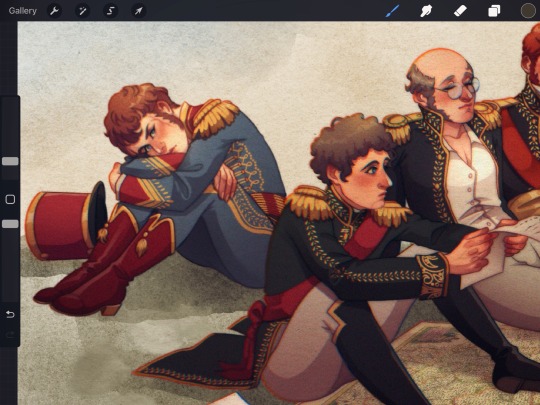


Everyone’s tired after a long battle, but at least Marshal Murat looks great in his ridiculous hat 🎩 😮💨
How’re y’all doing?? 😣💖 I’m so bored. All I do is school and exercise. I’m so so shy when I go to the gym! There’re these huge men lifting huge weights like omg how?! 😖🏃♀️💨 Anywayssss, I’m so sorry about Eugene 😢 I don’t actually know what he looks like lmaooo
#napoleon’s marshals#napoleonic era#digital art#jean andoche junot#louis alexandre berthier#louis nicolas davout#michel ney#napoleon bonaparte#eugene de beauharnais#jean baptiste bessières#joachim murat#🌸😘✌️
162 notes
·
View notes
Text

Napoleon and alexander pregnant baby is me! 😄😁😆😢
39 notes
·
View notes
Text

The Good News, Marguerite Gérard, 1804
#art#art history#Marguerite Gérard#female artists#genre painting#genre art#interior#Napoleonic era#Rococo#French art#19th century art#oil on panel#Musée Jean-Honoré Fragonard de Grasse
160 notes
·
View notes
Text

These four seem to be the most popular marshals in this fandom… So they shall unite.
#napoleon’s marshals#napoleonic wars#napoleonic era#michel ney#joachim murat#jean de dieu soult#jean lannes#slowly breaking my vow to never draw historical ppl#with cutesy artstyle#my art
219 notes
·
View notes
Text
Don't worry I have more.
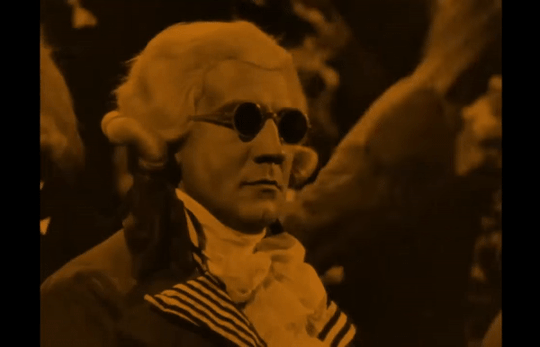
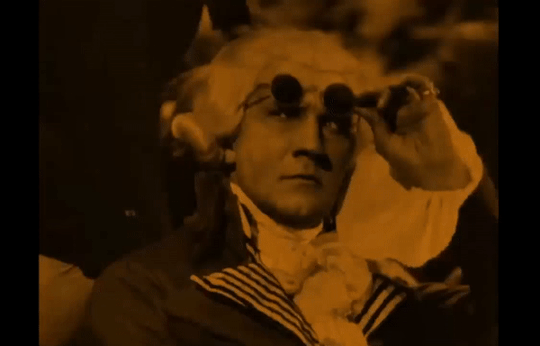
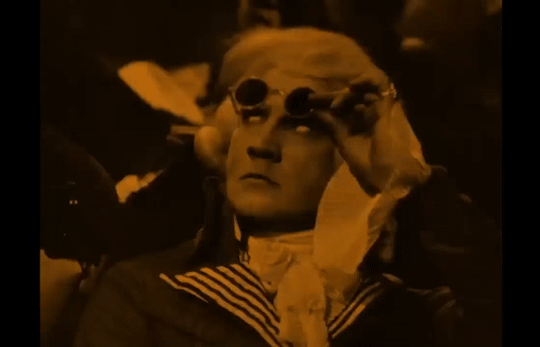
Edmond Van Daële as Maximilien de Robespierre.
Napoleon 1927.
#movies#robespierre#maximilien robespierre#napoleon 1927#napoleonic era#french revolution#Edmond Van Daële#napoleon#napoléon bonaparte
318 notes
·
View notes
Text
Napoleon and Nicolas Appert: The invention of canned food
“Although he [Napoleon] continued so far as possible the Revolutionary practice of having armies live off the land, he also did his best to develop an efficient commissariat. A famous part of his supply system was canned food, particularly meat, for the army. Nicholas Appert had started the food-canning industry in 1804, building a factory that employed fifty people. His method prescribed putting the food in glass jars, which were next carefully stoppered, and then cooked in boiling water for lengths of time varying with the type of food. The navy first used the canned food, with great success even on extended cruises. In 1810 the Minister of the Interior awarded Appert 12,000 francs on condition he make his process public.”
— Robert B. Holtman, The Napoleonic Revolution
The inventor of canning, Appert, deposited samples of his invention to the imperial government in 1809, specifically to the Society for the Encouragement of National Industry [Société d'Encouragement pour l'Industrie Nationale].
He published his findings in 1810, titled: Le livre de tous les ménages ou l'art de conserver pendant plusieurs années toutes les substances animales et végétales [English tr: The Art of Preserving All Kinds of Animal and Vegetable Substances For Several Years]. It was “a work published by the order of the French Minister of the Interior, on the report of the Board of Arts and Manufactures”.
For his discovery, the government paid him 12,000 francs and gave him free lodgings and a workshop in the Hospice des Quinze-Vingts. Every prefecture in the French Empire was supplied with a copy of his book, and the prefects were assigned the responsibility of disseminating the information widely. Two more editions were created under the empire, and another in 1831.
His factories were ransacked and destroyed during the invasions of France in 1814 and again in 1815. He was able to rebuild and won several gold medals from the Society for the Encouragement of National Industry and eventually became a member of the Society.
Appert is quoted as saying “I sacrificed everything for humanity, all my life”.
Additional Sources:
English translation of Appert’s 1810 publication
Nicolas Appert inventeur et humaniste, Jean-Paul Barbier, 1994 (Fondation Napoléon)
Collection A. Carême: Le conservateur 1842 (archive.org)
Defining Culinary Authority: The Transformation of Cooking in France, 1650-1830 by Jennifer J. Davis
#he’s my hero 😭#Nicolas Appert#Appert#Napoleon#napoleon bonaparte#canned food#Robert B. Holtman#Holtman#the Napoleonic revolution#napoleonic era#napoleonic#canned#canning#first french empire#french empire#19th century#history#Jean-Paul Barbier#Barbier#culinary history#french history#napoleonic wars#coalition wars#1800s#food#food history#gastronomy#Napoleonic reforms#reforms#Napoleon’s reforms
18 notes
·
View notes
Text
Look what I found at the national portrait gallery!
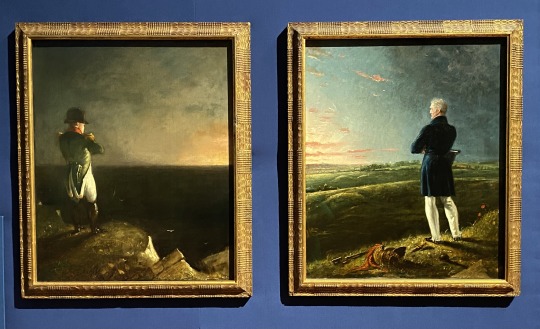
#matching portrait with your worst enemy <3#napoleon#napoleon bonaparte#duke of wellington#arthur wellesley#napoleonic era#napoleonic wars#art history
244 notes
·
View notes